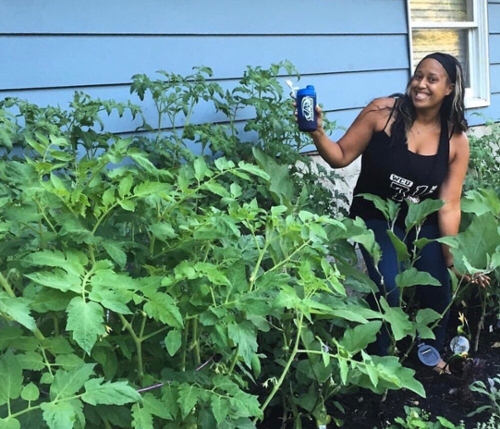Faculty, community partners address hunger and nutrition with Glassboro Food and Health Equity Project
Faculty, community partners address hunger and nutrition with Glassboro Food and Health Equity Project

A team of Rowan University faculty and their community partners will begin a project this spring to address a need that’s far too common, especially in underserved communities – a scarcity of nutritious, affordable food.
The researchers, in partnership with numerous community groups and with the support of a $50,000 grant from New Jersey Health Initiatives (a statewide grantmaking program of the Robert Wood Johnson Foundation), will begin working with local families to help them eat better and live healthier, beginning with produce they can grow cheaply and easily at home.
Dr. Mahbubur Meenar, an assistant professor of Planning in the Department of Geography, Planning and Sustainability within the School of Earth & Environment, said the Glassboro Food and Health Equity Project has ambitious but feasible goals.
“In Glassboro, about 22% of the nearly 20,000 residents live below the poverty level, compared with 7.6% of all Gloucester County residents,” Meenar said. “There is a greater need to serve a food-insecure population here, especially during the pandemic.”
The Glassboro Food and Health Equity Project, he said, “aims to engage cross-sector partners, including non-profits, health sectors, residents and government agencies in developing solutions to make affordable, nutritious food more readily accessible.”
Some of that will rely on helping to train residents in producing a portion of their food at home, in small, sustainable, affordable gardens.
Meenar said the two-year project, which officially began Oct. 15, will start with evaluations to determine household eating habits and locations for a garden based on available space and access to direct sunlight. He said some families who have yards could be encouraged to start outdoor gardens while others might be encouraged to grow indoors.
“Food access is an important issue,” Meenar said. “Sometimes the issue is physical – people may not have access to transportation and supermarkets may not be within walking distance.”
He noted that other issues, such as income, can also be barriers to nutritious food, especially to high quality fresh produce that families can grow like potatoes, tomatoes, peas, beans, lettuce and microgreens.
Meenar said he and co-investigator Dr. Leslie Spencer, a professor of Health and Exercise Science in Rowan’s School of Health Professions, along with Bullock Garden Project, will lead the pilot program involving 30 Glassboro families.
Professor Melanie Stewart, an associate dean of the College of Performing arts and chair of the Creative Glassboro Advisory Board, chairs the Glassboro Health Equity Coalition and the team is working with Sonya Harris, founder of the non-profit Bullock Garden Project, for horticultural advice, participant recruitment and workshops.
Spencer, a certified health coach, said she and three Rowan students who will be trained as health coaches will help motivate participating families to focus on wellness.
The health coaches will offer guidance for residents to live healthier, particularly in their food choices, she said.
“Coaching uses a specific set of strategies to help build internal motivation to help people make the change they want to make,” Spencer said.
The first step, she said, is working with families to determine what changes they want to make for better health, and often that can start with diet.
“We’ll come up with a strategy that works for them,” Spencer said.
As for healthier eating, she said, “we’re asking people to invest the time and energy to grow their own garden.”
Partners in the project include Rowan University, Creative Glassboro, Mosaic Family Success Center, the Bullock Garden Project, the Borough of Glassboro, Inspira Health and Inspira Foundation, ACENDA and the Gloucester County Health Department.
Rowan, as a community neighbor, has also committed to fighting food insecurity and, in partnership with the Borough of Glassboro and Rowan’s food provider Gourmet Dining, this fall began providing up to 200 free meals per week to Glassboro residents.